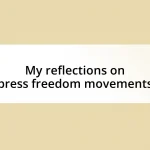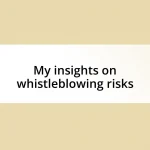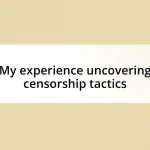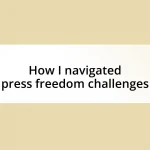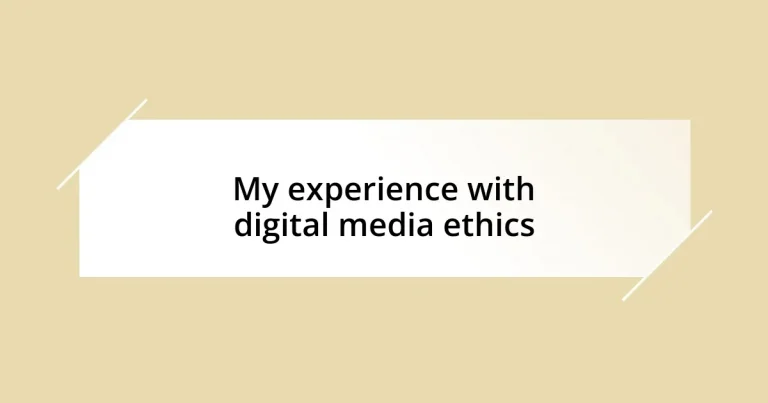Key takeaways:
- Digital media ethics is essential for fostering trust and accountability in online interactions, particularly in the face of misinformation.
- Key principles of digital ethics include transparency, accountability, respect, justice, and privacy, emphasizing responsible behavior in online spaces.
- Challenges like representation and the pressure to conform can create ethical dilemmas, highlighting the need for critical thinking and authenticity in digital expression.
- The future of digital media ethics must adapt to evolving technologies, prioritize data privacy, and promote critical media literacy among users.
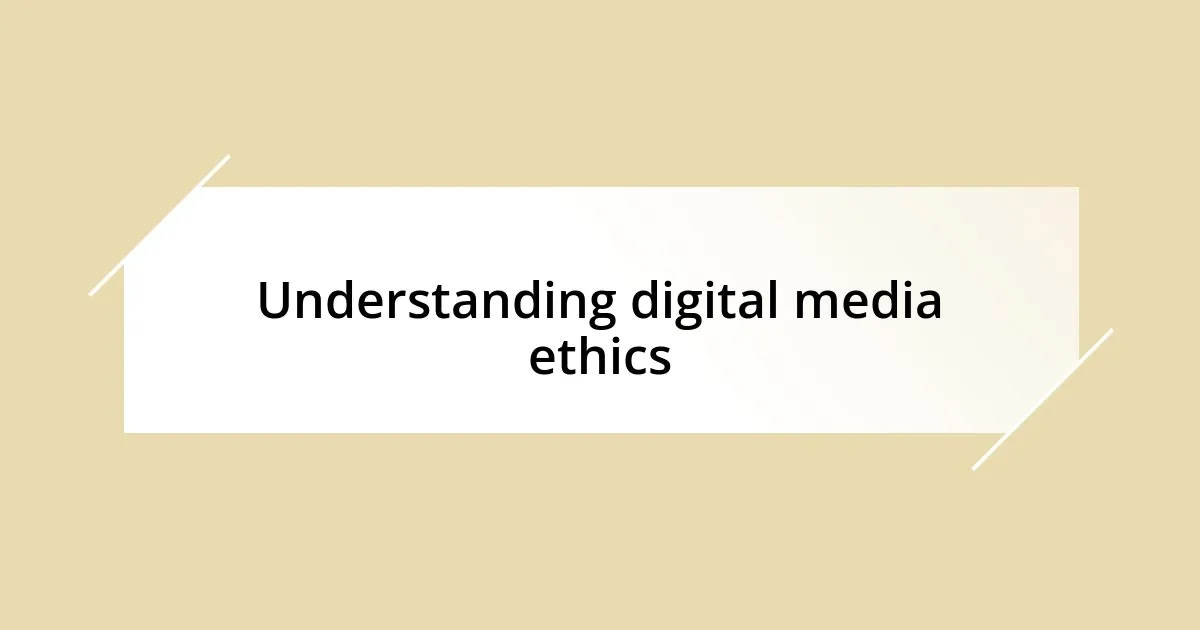
Understanding digital media ethics
Understanding digital media ethics can feel like navigating a labyrinth of expectations and responsibilities. I remember when I first encountered the term during a media ethics course; it struck me how the principles guiding our digital interactions are just as crucial as those in face-to-face communication. When I questioned how ethical considerations might change from traditional media to digital platforms, it opened my eyes to a spectrum of dilemmas we face today.
Consider the implications of sharing information online. One day, I stumbled upon a sensational story that turned out to be misleading. It shocked me how quickly misinformation can spread and the impact of that on public perception. Have you ever shared something without verifying its accuracy? I learned that digital ethics isn’t just about following rules; it’s about fostering trust and accountability in our shared spaces.
We often overlook the responsibilities that come with the power of digital expression. I recall a moment when I witnessed backlash against an influencer for a thoughtless post, which made me realize how actions in the digital world resonate far beyond our screens. Are we truly aware of our potential to influence and harm others? Embracing digital media ethics means acknowledging our role in creating a respectful and informed online community.
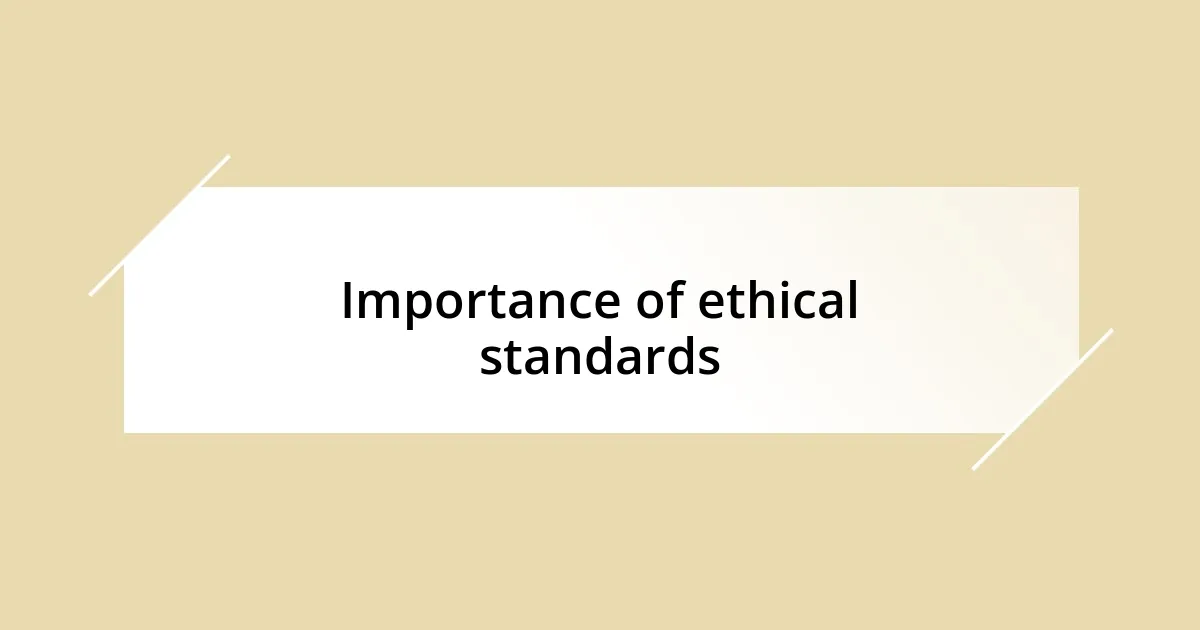
Importance of ethical standards
Ethical standards in digital media serve as a moral compass, guiding creators and consumers alike. I recall a time when I was involved in a heated online debate about a social issue. It dawned on me how quickly opinions can escalate into harmful narratives when ethical considerations are cast aside. This experience reinforced my belief that without a foundation of trust and integrity, the very fabric of our online communities can unravel.
Moreover, ethical standards help to establish a level of accountability that we desperately need. I remember when a viral video depicting a sensitive topic was posted without considering the impact on the individuals involved. The conversations that followed prompted outrage and regret, illuminating the necessity of thinking before sharing. This underscored for me how ethical standards not only protect individuals but also shape public discourse in meaningful ways.
Ultimately, adhering to ethical standards is not merely a guideline; it is a commitment we make to ourselves and our communities. I once encountered a journalist who passionately advocated for truth and honesty, stating, “Our words carry weight.” This resonates deeply with me, as I’ve seen both the harm and the healing that ethical practice can bring to digital media. Striving for ethical excellence enriches our interactions and fosters a culture of respect and understanding.
| Aspect | Importance of Ethical Standards |
|---|---|
| Trust Building | Essential for creating credibility in digital interactions. |
| Accountability | Promotes responsible behavior and mitigates harm. |
| Public Discourse | Shapes healthy dialogues and respects diverse perspectives. |
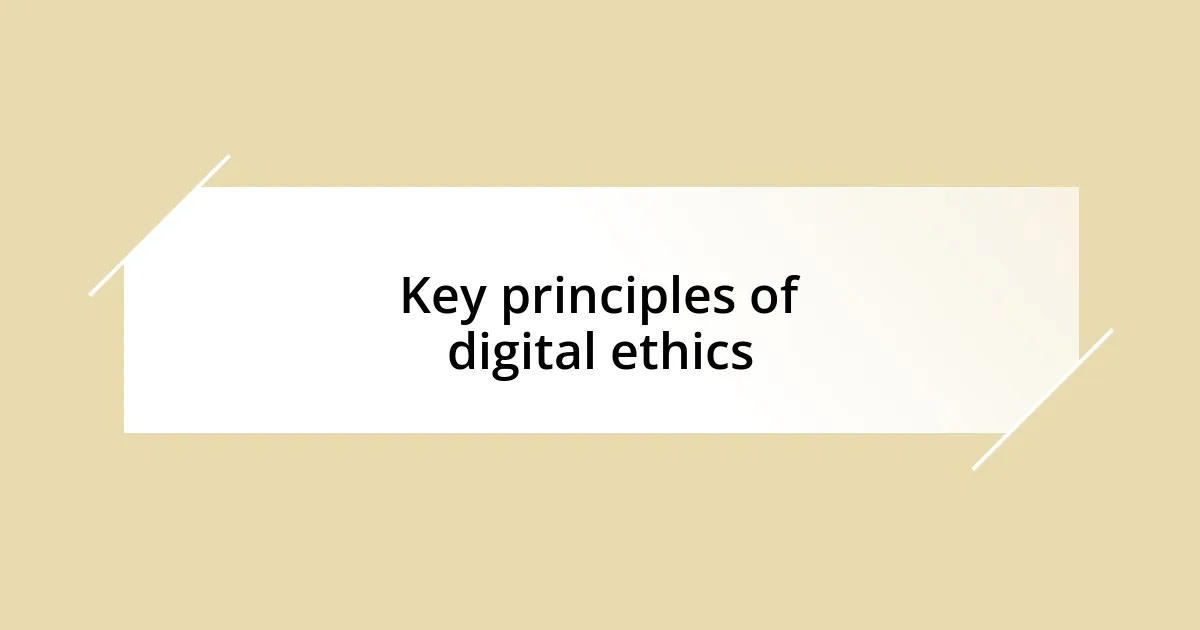
Key principles of digital ethics
Digital ethics is built on fundamental principles that dictate our behavior in online spaces. I still vividly remember my early days on social media when I naively shared posts without considering their origin. That experience taught me the value of transparency; knowing where information comes from fosters trust. As I’ve grown in my understanding, I’ve seen how adhering to principles like fairness, accountability, and respect can profoundly influence our online interactions.
Here are some key principles I believe everyone should consider:
- Transparency: Always disclose sources and motivations behind shared content.
- Accountability: Take responsibility for your digital footprint and the consequences of your online actions.
- Respect: Treat others with dignity, even in disagreements, and consider the impact of your words.
- Justice: Ensure equal access to digital resources and a fair representation of all voices.
- Privacy: Safeguard personal information and respect the privacy of others in digital spaces.
Each principle serves as a reminder that our online behaviors echo into the real world, shaping perceptions and consequences alike. I learned this the hard way when I accidentally shared a post that invaded someone’s privacy. The backlash and regret drove home the lesson of empathy and consideration in the digital realm.
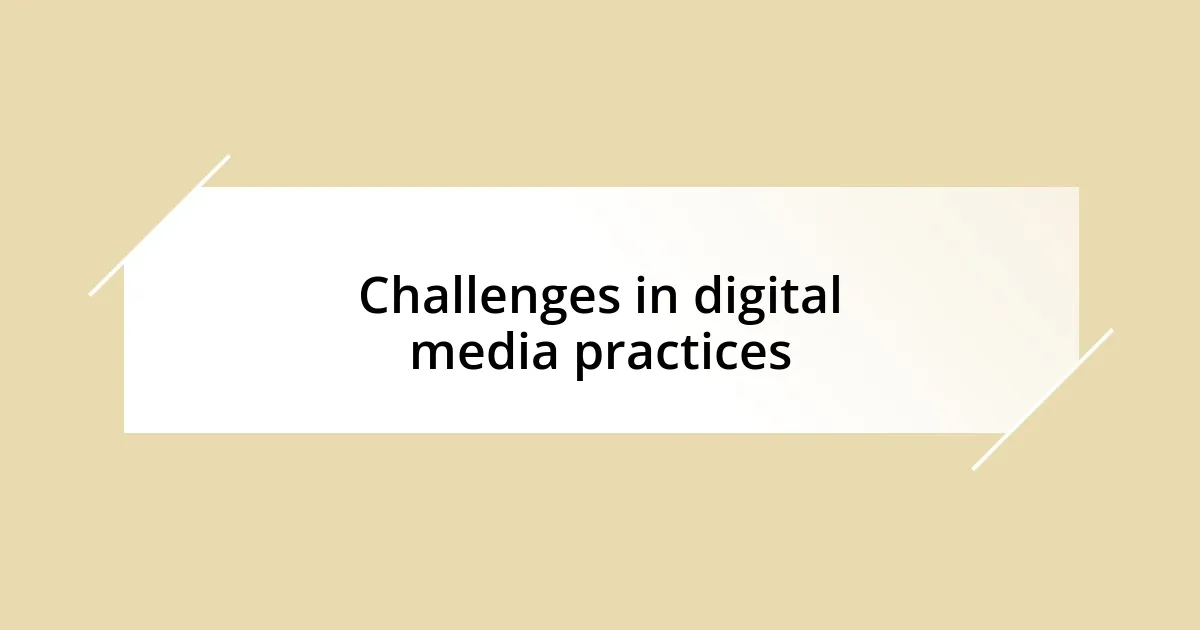
Challenges in digital media practices
Navigating the landscape of digital media practices presents a unique set of challenges that can easily trip up even the most well-meaning individuals. I recall an incident where I shared a sensational headline without verifying it first. The fallout was quick and intense; friends and family were misled, and I felt a wave of shame wash over me. This experience highlighted how the speed at which we consume and share information can compromise our critical thinking. Are we prioritizing immediacy over accuracy? I learned that rushing to hit “share” can have real consequences.
Another challenge that looms large is the issue of representation. I remember attending a community meeting where voices from marginalized groups were notably absent in the online discussion. It struck me how easy it is to overlook the spectrum of perspectives available in digital spaces. This realization made me ponder: are we amplifying diverse voices enough? It’s crucial that we not only seek out varied viewpoints but also ensure that everyone has a seat at the table.
Lastly, the constant pressure to maintain an online presence can create ethical dilemmas. I once found myself in a position where I felt compelled to post about an event I attended, but I struggled with the urge to curate a specific image instead of sharing an authentic experience. This conflict brought up a vital question: does the image we project online align with our true selves? Balancing authenticity with social media expectations is an ongoing struggle, and it became evident to me that being genuine is not just a choice; it’s an ethical imperative in digital media.
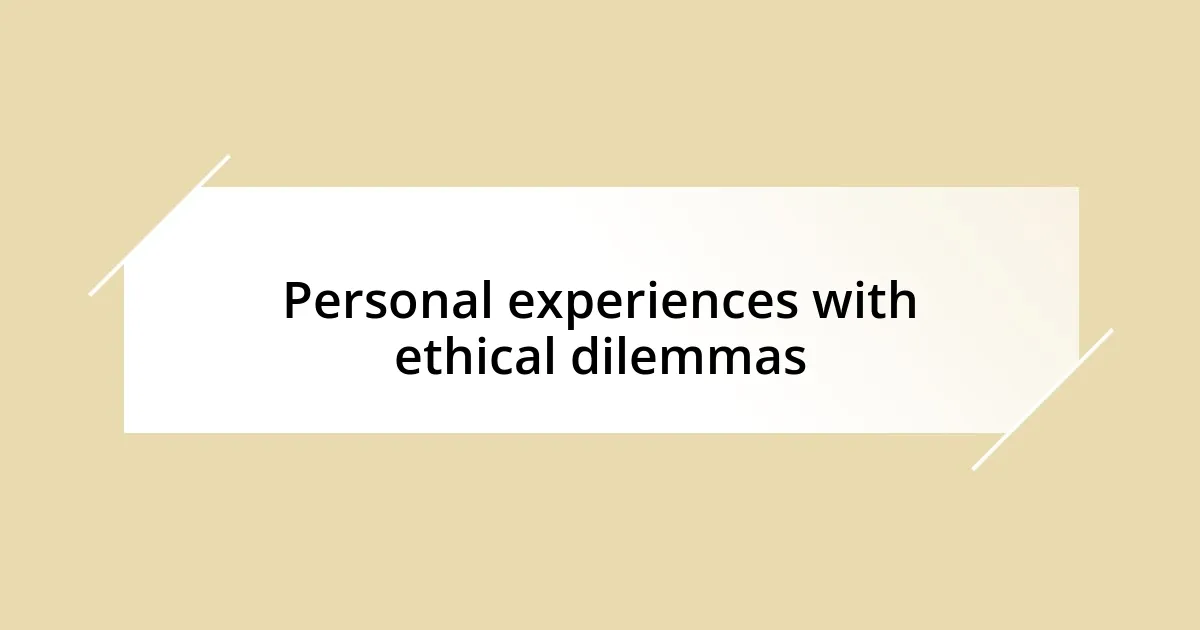
Personal experiences with ethical dilemmas
Navigating ethical dilemmas in digital media has often felt like walking a tightrope for me. There was a particular incident when I stumbled upon a viral video that depicted an emotional moment involving a public figure. I was tempted to share it, feeling like it would resonate with my friends. But then I paused. What if the context was taken out of balance? My hesitation led me to dig deeper, ultimately uncovering that the video had been heavily edited. That moment reinforced the significance of critical thinking before hitting “share.”
Another time, I remember writing a blog post that touched on a sensitive topic. I was really invested in fostering a conversation, but I struggled with the fear of misrepresenting a marginalized group’s perspective. I reached out to a friend from that community to ensure I was presenting their voice authentically. Their insight was invaluable—it not only enriched my writing but also illuminated the responsibility we hold as content creators. Shouldn’t we strive to elevate voices that might otherwise go unheard? This experience deepened my belief that ethical engagement is essential in establishing meaningful dialogues online.
Then there was a phase where I found myself in a social media storm over a controversial topic. Everyone was sharing their opinions, and the discourse quickly turned toxic. I felt the urge to voice my thoughts but worried about the backlash. I chose to step back and reflect instead, which taught me the balance between participating in important discussions and knowing when to exercise restraint. Isn’t it crucial to discern when to amplify our voices and when to listen? In moments like this, I realized that ethical decision-making isn’t just about what we say; it’s also about knowing when silence speaks volumes.
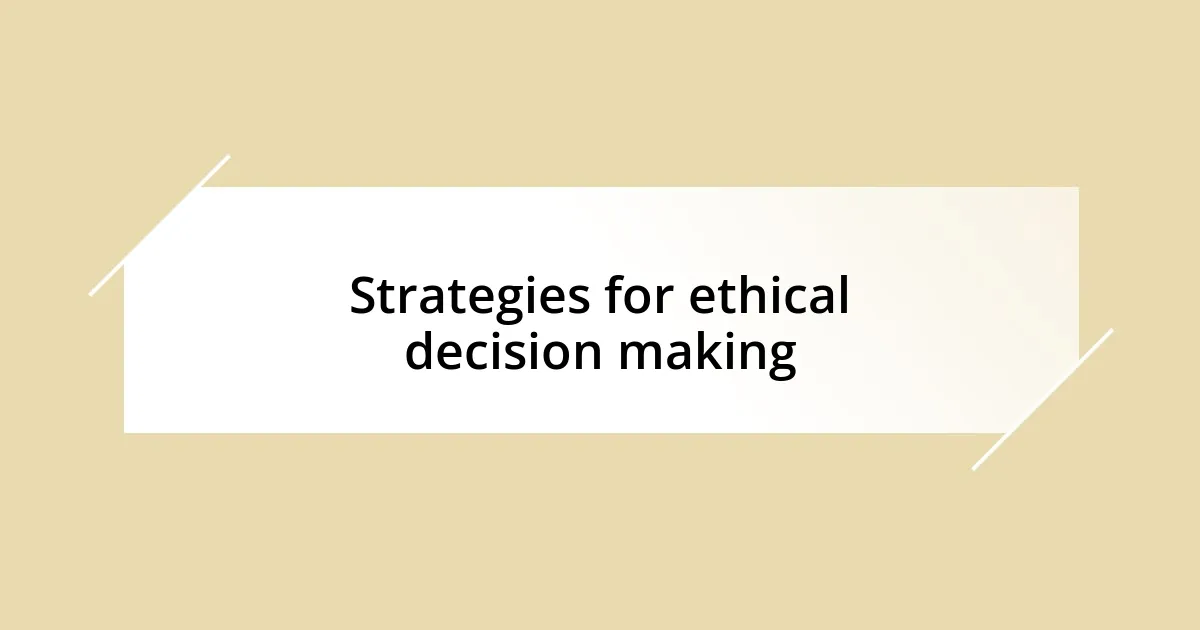
Strategies for ethical decision making
When it comes to ethical decision-making, I always start by reflecting on my motivations. A while back, I posted about an event that didn’t sit right with me after attending. I loved the camaraderie, but I noticed how the messaging subtly sidelined important issues. I asked myself, “Am I contributing to a narrative that overshadows the bigger picture?” That moment pushed me to ensure that my voice is not just echoing positivity but also addressing underlying concerns, balancing my engagement with a sense of responsibility.
Another strategy I’ve found effective is consulting diverse perspectives before acting. I vividly recall the time I was crafting a social media post about a trending topic that involved multiple communities. I hesitated, recalling the importance of representation and inclusivity. Instead of jumping into the conversation, I sought feedback from friends who belonged to those communities. This collaborative approach not only enriched my understanding but also helped me avoid potential pitfalls. Isn’t it amazing how a little dialogue can foster a more respectful and inclusive narrative?
Finally, I prioritize transparency in my digital interactions. There was an instance when I discovered some disturbing truths about a popular brand I had previously endorsed. It was uncomfortable to confront, but I knew I had to update my followers. Choosing to admit my initial mistake and educate others felt daunting, yet liberating. This experience taught me that clarity and honesty can strengthen trust. How often do we reassess our commitments in light of new information? Embracing transparency can lead to deeper connections and ethical integrity in our online presence.
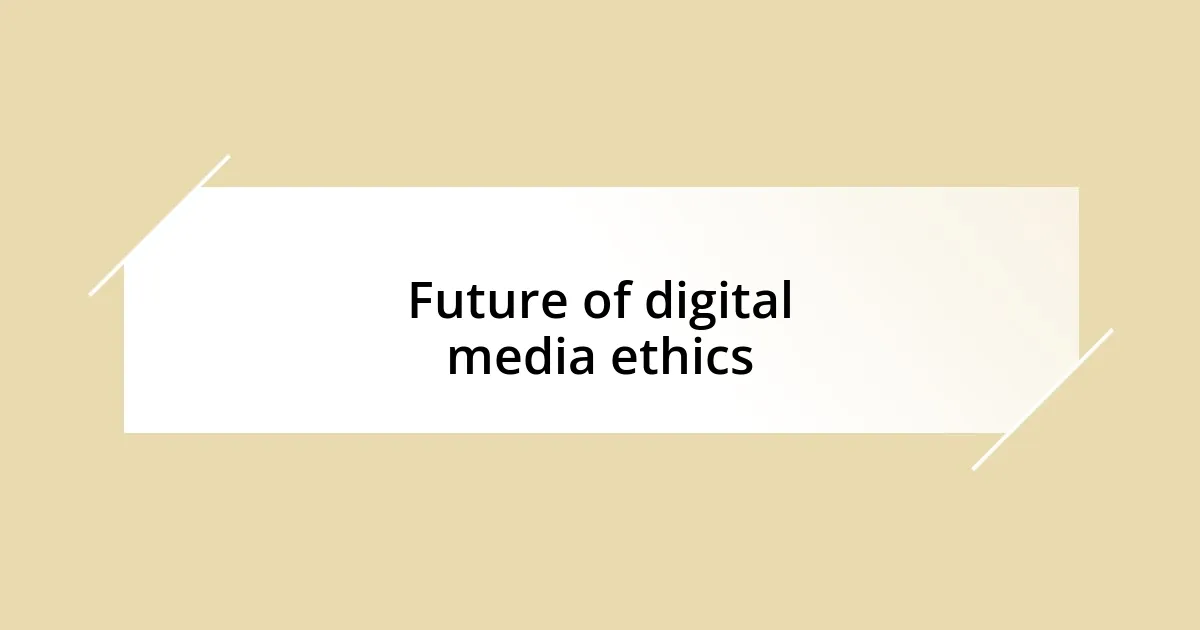
Future of digital media ethics
The future of digital media ethics is evolving rapidly, influenced by the rise of technology and social platforms. I often wonder how we can adapt our ethical frameworks to the challenges ahead. For instance, as algorithms continue to shape content visibility, are we responsible for understanding their biases? A few months ago, I stumbled upon an article highlighting how engagement-driven algorithms can lead to echo chambers. It made me question how much our curated content influences our perspectives.
Looking down the line, I see a significant emphasis on data privacy becoming a cornerstone of ethical discourse. Just recently, I participated in a webinar about the implications of data collection practices. It struck me how often we overlook the fact that our personal data is being traded. Shouldn’t we demand transparency from platforms that profit from our information? This realization reaffirms my commitment to advocate for user rights and ethical data usage, sparked by my responsibilities as a digital citizen.
What excites me most is the conversation around digital literacy. Increasingly, I find myself encouraging friends and family to think critically about the media they consume. Just last week, a friend shared a sensational headline, and I paused to dissect it together. “What do we really know about this source?” I asked. It’s fascinating how fostering critical thinking can transform how we engage with content. As we move forward, nurturing this awareness will be crucial in building a more ethical digital landscape. Will we rise to this challenge together?






